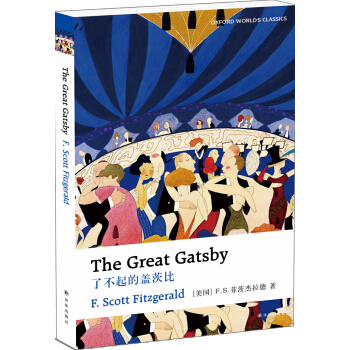![牛津英文经典:查拉图斯特拉如是说(英文版) [Thus Spoke Zarathustra]](https://pic.tinynews.org/11886729/56dfebd0N42f6e77d.jpg)

具体描述
编辑推荐
牛津大学出版百年旗舰产品,英文版本原汁原味呈现,资深编辑专为阅读进阶定制,文学评论名家妙趣横生解读。内容简介
《查拉图斯特拉如是说》是尼采借查拉图斯特拉之名宣讲自己的哲学思想,是尼采里程碑式的作品,几乎包括了尼采的全部思想。全书用散文诗体写成,以振聋发聩的奇异灼见和横空出世的警世智慧宣讲“超人哲学”和“权力意志”,横扫了基督教所造成的精神奴性,谱写了一曲自由主义的人性之歌。本书并不像说教那样枯燥乏味,具有极高的文学价值,在世界哲学史和诗歌史上均占有独特的不朽的地位。作者简介
弗里德里希·尼采(Friedrich Nietzsche, 1844—1900),著名德国思想家,诗人哲学家。他强力批判西方传统的基督教文化,否定基督教传统的道德体系,主张重估一切价值;他提倡创造一种生存的意义,为后来的存在主义奠定了基础,被誉为存在主义的先驱之一;他热爱生命,提倡昂然的生命力和奋发的意志力,肯定人世间的价值,给欧洲古典哲学注入新鲜血液并开辟了古典语言学的崭新时代。从这个意义上说,他开创了人类思想史的新纪元,哲学史可以以尼采前和尼采后来划分。在尼采之后,传统的哲学体系解体了,哲学由非存在转变为存在,从天上回到地上,由神奇莫测、玄而又玄转变为引起亿万人心灵的无限共鸣。精彩书评
谓今日欧洲之文化艺术,下至人民生活,无不略受影响于尼氏者,非过论也。——王国维
在哲学上,他深刻地启发了斯宾格勒、萨特等许多有影响的哲学家。在文学上,他对德国的里尔克和托马斯·曼,法国的纪德和马尔罗,英国的萧伯纳和叶芝,中国的鲁迅、茅盾和郭沫若等人的影响也是众所周知的。
——张汝伦
目录
AbbreviationsIntroduction
Note on the Text and Translation
Select Bibliography
A Chronology of Friedrich Nietzsche
THUS SPOKE ZARATHUSTRA
Explanatory Notes
Index
精彩书摘
IWhen Zarathustra was thirty years old, he abandoned his home and the lake of his home and went into the mountains Here he enjoyed his spirit and his solitude and for ten years did not tire of them.* At last, however, there was a change in his heart-and so one morning with the dawn of morning he rose, stepped out before the sun. and spoke to it thus:
‘Greetings, Great Star! What would your happiness he, were it not for those whom you illumine!*
For ten years you have come up here to my cave: you would have grown weary of your light and of this course without me, my eagle, and my serpent!
‘But we were waiting for you every morning. took from you your over?ow and also blessed you for it
‘Behold! I am overburdened with my wisdom: like the bee that has gathered too much honey, I need hands outstretched to receive it.*
‘I should like to bestow and distribute. until the wise among human beings once again become glad of their folly and the poor once again of their riches.
‘For that I must descend into the depths: just as you do in the evening when you go down behind the sea and still bring light to the underworld, you overrich star!*
‘I must, like you, go under, as human beings call it, to whom I would go down. ‘So bless me than, you tranquil eye, who can look without envy even upon all-too-great happiness!
‘Bless the cup that wants to over?ow, that the water may ?ow from it golden and carry everywhere the re?ection of your delight!
‘Behold! This cup wants to become empty again, and Zarathustra wants to become human again."
—Thus began Zarathustra’s going-under.
2
Zarathustra climbed down the mountain alone and no one encountered him. But when he came into the forest, there suddenly stood before him an old man who had left his holy hut in order search in the forest for roots. And thus spoke the old man to Zarathustra:
‘No stranger to me is this wanderer: many years ago he passed by here before Zarathustra he was called; but now he has transformed himself .
‘Then you were carrying your ashes to the mountains: would you today carry your fire into the valleys? Do you not fear the arsonist’s punishment?
‘Yes. I recognize Zarathustra. Clear is his eye, and around his mouth no trace of disgust. Does he not walk like a dancer?
‘ Zarathustra is transformed, Zarathustra has become a child, Zarathustra is an awakened one: what do you want now among sleepers? *
‘You lived in your solitude as if in the sea, and the sea bore you up. Alas, you want to climb onto land? Alas, you want to drag your body yourself again?’
Zarathustra answered: ‘I love human beings.‘
‘But why’, said the holy man, ‘did I go into the forest and the desert? Was it not because I loved human beings all too much?
‘Now I love God: human beings I love not. The human being is for me too incomplete an affair. Love of human beings would be the death of me.’
Zarathustra answered: ‘What did I say of love! I bring human beings a present.’
‘Give them nothing,‘ said the holy man. ‘Rather take something from them and carry it for them: that will do them the greatest good—as long as it does you good!
‘And if you would give to them, then give them nothing more than alms, and let them beg even for that!’
‘No,’ answered Zarathustra, ‘I give no alms. For that I am not poor enough.’
The holy man laughed at Zarathustra and spoke to him thus: ‘Then see to it that they accept your treasures! They are suspicious of solitaries, and do not believe that we come in order to bestow.
‘Too lonely for them is the sound of our footsteps in the lanes. And when in their beds at night they hear a man going by long before the sun has risen, they surely ask themselves: Where is that thief going?
‘Do not go to human beings but stay in the forest! Go rather even to the beasts! Why would you not be, like me—a hear among the bears, a bird among the birds?’
‘And what does the holy man do in the forest?‘ asked Zarathustra.
The holy man answered: ‘I make up songs and sing them, and as I make up songs, I laugh and weep and growl: thus do I praise God.
‘With singing, weeping, laughing, and growling I praise the God who is my God. But what do you bring us as a present?’
When Zarathustra heard these words he saluted the holy man and said: ‘What could I have to give to you! But let me go quickly, that I might take nothing from you!'—And thus they patted from each other, the old man and the younger, laughing, just like two boys laughing.
But when Zarathustra was alone again, he spoke thus to his heart;*
‘Could this be possible! This old holy man in his forest has heard nothing of this yet. that God is dead!’-
3
When Zarathustra came to the nearest town, which lay on the edge of the forest, he found there a crowd of people gathered in the market-square, for it had been announced that a rope-dancer* would be appearing. And Zarathustra spoke to the people thus:
‘I teach to you the Overhuman. The human is something that shall be overcome. What have you done to overcome it?
‘All beings so far have created something beyond themselves: and you want to be the ebb of this great tide, and even go back to the beasts rather than overcome the human?
‘What is the ape for the human being? A laughing-stock or a painful cause for shame, And the human shall be just that for the Overhuman: a laughing—stock or a painful cause for shame.
‘You have nude your way from warm to human, and much in you is still warm. Once you were apes, and even now the human being is sill more of an ape than any ape is.*
‘Whoever is the wisest among you is still no more than a discord and hybrid between plant and spectre. But do I bid you become spectres or plants? ‘Behold. I teach to you the Ovehuman!
‘The Overhuman is the sense of the earth. May your will say Let the Overhuman be the sense of the earth!
‘I beseech you, my brothers, stay true to the earth and do not believe those who talk of over-earthly hopes! They are poison-mixers, whether they know it or not.
‘They are despisers of life, moribund and poisoned themselves, of whom the earth is wary: so let them pass on!
‘Once sacrilege against God was the greatest sacrilege, but God died, and thereby the sacrilegious died too. Sacrilege against the earth is now the most terrible thing, and to revere the entrails of the unfathomable more than I sense of the earth!
‘Once the soul looked despisingly upon the body, and at that time this despising was the highest thing: she wanted the body to be lea, ghastly, and starved. Thus she thought to slip away from the body and the earth.
‘Oh this soul was herself still lean, ghastly, and Starved :and cruelty was the lust of this soul!
‘But you too, my brothers, tell me: what does your body proclaim about your soul? Is your soul not poverty and ?lth and wretched contentment?
‘Verily, a polluted stream is the human. One must be a veritable sea to absorb such a polluted stream without becoming unclean.
‘Behold. I teach to you the Overhuman: it is this sea, in this can your great despising submerge itself.
‘What is the greatest you could experience? It is the hour of the great despising. The hour in which even your happiness disgusts you and likewise your reason and your virtue.
‘The hour when you say: “What good is my happiness! It is poverty and ?lth and wretched contentment. But my happiness should justify existence itself!"
‘The hour when you say: “What good is my reason! Does it crave knowing as the lion craves its food? It is poverty and ?lth and wretched contentment"
……
前言/序言
Thus Spoke Zarathustra-A Book for Everyone and Nobody: the subtitle, at first puzzling, is also telling. The work is for ‘nobody’ insofar as it’s an intensely personal piece of philosophizing: ‘There is in this book an incredible amount of personal experience and suffering that is comprehensible only to me-many pages strike me as most blood-thirsty’(B Aug 1883).So why did Nietzsche bother to make public his personal experience? And to what extent is the result philosophy, whose practitioners have traditionally aimed at impersonality, generality, or even unusual understanding of philosophy and the philosopher, as exemplified in his most unusual book: Thus Spoke Zarathustra.Nietzsche knew that what is personal may after all touch others, though the process remains obscure. ‘Strange!’ he wrote in the 1880.’I am dominated at every moment by the thought that my history is not only a personal one, that I am doing something for many people when I live like this and work on and write about myself this way’ (W9:7[105]). A few years later he says this about the way philosophers can transform life-experience into thoughts: ‘We must constantly give birth to our thoughts out of pain, and nurture them with everything we have in us of blood ,heart ,fire ,pleasure ,passion ,agony ,conscience ,fate ,and catastrophe. Life to us-that means constantly transforming everything we are into light and flame, as well everything that happens to us’(JS Preface,3). Such light and flame can illumine the way for others through the medium of written page, as long as the style is sufficiently vibrant.
Then the life that is saved in the book is immortal since it survives its author’s death with a strange autonomy: ‘It seeks out readers for itself, ignites new life, delight, terrifies, engenders new works, become the soul of plans and actions’(HA 208).If the word ‘instructs’ is notably absent from this list of capabilities, this is because Nietzsche follows Goethe’s well-known dictum : ‘I hate everything that merely instructs me ,without amplifying or directly enlivening my activity.’ It is his concern with imbuing Zarathustra’s pages with the most vital life that enables a presentation of the personal to transform the reader’s experience: ‘Whoever has lived in this book returns to the world with an altered face and vision’(B 22Feb. 1884). Dozens of Nietzsche’s letters testify to a passionate desire to reach other people and change their minds.
We can see, then, how Zarathustra might be a book for someone other than the author, but this hardly makes it a book ‘for everyone’. Martin Heidegger reads the ‘for everyone’ helpfully as ‘for every human being as a human being, for each one whenever and insofar as one becomes for oneself worthy of thinking about in one’s essential nature’.But how many of us become that for ourselves? Nietzsche does claims, in a letter written while he was composing the third part of the book (B13 Feb.1883),that the work is ‘accessible to anyone’-but since he is writing to his publisher, and authors seldom proclaim minimal market for their books, a little scepticism might be appropriate. Nonetheless, the publication history of Zarathustra suggests that the book has a remarkably broad appeal: just as it was the author’s favourite among his works, it has also been the most popular among general readers (if not among Nietzsche scholars).
Heidegger reads the ‘for nobody’ of the subtitle as meaning ‘for nobody among the inquisitive types who...merely intoxicate themselves with isolated fragments and particular aphorisms from this book’. This makes sense in view of Zarathustra’s calling aphorism ‘mountain peaks’ or ‘summits’, which suggests a vast mass of supporting material (thoughts, ideas, images) to be negotiated before they can be adequately understood. This takes work-or, to put it more encouragingly: Zarathustra, is a text that richly repays the effort of repeated readings over time.
For a deeper understanding of the book, Nietzsche reminds us , we need to appreciate its context: ‘To have the prerequisite for understanding Zarathustra, all my earlier writings must be genuinely and profoundly understood; also the necessity of the sequence of these writings and the development expressed in them’(B 29 Aug.1886). Even if one restricts the requirement to his published works it is still exacting, in view of the seven books that appears before Zarathustra: The Birth of Tragedy, Untimely Observations, Human, All Too Human, Assorted Opinions and Maxims, The Wanderer and His Shadow, Dawn of Morning, and The Joyful Science. Nietzsche explicitly refers to these last two as ‘commentaries on Zarathustra written in advance of the text’(B 7 Apr.1884).
If all this doesn’t enlighten sufficiently, one can turn to Nietzsche’s next book, Beyond Good and Evil, which he wrote as an explication of Zarathustra, since so few readers appeared to have understood the earlier text. In a letter to the historian Jacob Burckhardt, whose colleague Nietzsche had been at the University of Basel, he wrote: ‘It says the same things as my Zarathustra, but differently, very differently’(B22 Sept. 1886).Lastly, there is an indispensable discussion of Zarathustra in one of Nietzsche’s last works Ecce Homo(1880).
The nineteenth century was a time of fervent Orientalism in Europe, with especial interest in Zoroastrianism. Zoaster is the Greek name for the Persian prophet Zarathustra. whose dates are unknown but who probably ?ourished same time between the twelfth and sixth centuries race. In the ?fty years before Nietzsche’s book appeared, over twenty major studies of the Zend-Avesta(the sacred text attributed to Zarathustra) and/or its author were published in‘ German. Having been a classical philologist, with friends who were Orientalists, Nietzsche was well aware of this interest in Zarathustra in academic circles and beyond. Later, in Ecce Homo, he remarks that no one has ever asked him ‘what the name “Zarathustra” means in[his] mouth‘ ( EH‘Why I Am a Destiny', 3). A notebook entry penned a few weeks after he was ?rst struck by the thought of eternal recurrence, which beanie the basic idea of Zarathustra , reads as follows:
Midday and Eternity
Hints toward a New Life
Zarathustra, born by Lake Urmi, left his home in his thirtieth year, went to the province of Aria and wrote the Zend-avesta during ten years of solitude in the mountains. (W 9: 11 [195])
This sentence is paraphrase of a passage from the cultural historian Friedrich von Hellwald concerning the Persian prophet. Somewhat modi?ed, it later becomes the opening sentence of Thus spoke Zarathustra. Hellwald also writes that Zarathustra was the ?rst to come up with the idea of: ‘moral order to the world’, As Nietzsche later puts it: ‘The transposition of morality into metaphysics…is his doing.” And so the reason for the choice of protagonist is this ‘Zarathustra created this disastrous error, morality; consequently he must be the ?rst to recognize this’ (EH ibid).
Like many a philosophical masterpiece, Zarathustra engages in a dialogue with earlier texts, though the range in this case goes beyond the philosophical to include the Homeric epics, the fragments of Heraclitus, Plato’s dialogues, the Luther Bible,Goethe‘s Faust. H?lderlin‘s Hyperion, Emerson’s Essays, and Wagner‘s Ring of the Nibelungen and parsifal and Patti/bl. As a schoolboy, Nietzsche was a voracious reader, and these literary texts were a formative in?uence on him Friedrich H?lderlin was, along with Goethe, Germany‘s greatest poet; but it was his epistolary novel Hyperion, whose protagonist is a romantic idealist devoted to the regeneration of his native Hellenic culture. that most fascinated the young Nietzsche, It is not generally appreciated that Ralph Waldo Emerson, ‘the Sage of Concord’, became so popular in Europe during his lifetime that his essays were regularly translated into German not long after their publication in Boston. At 17 Nietzsche recognized a wise mentor and kindred spirit in Emerson, whose powerfully eloquent prose style and ideas about fate, history, and the soul exerted a lasting in?uence on him as a thinker and writer. And since Zarathustra is a masterpiece of literature as well as philosophy (the author calls it a poetic composition), the ?gure of its protagonist is formed through deliberate associations with Homer’s Odysseus, Plato’s Socrates, some Old Testament prophets, the Jesus of the Gospels, Byron’s Manfred, Goethe‘s Faust, H?lderlin’s Hyperion, and Wagner’ s Siegfried and Parsifal.
用户评价
我不得不承认,我对这类“宏大叙事”的作品通常持有一种审慎的态度,毕竟它们往往伴随着巨大的期望,很容易让人感到被故作高深的语言所裹挟。然而,当我真正开始进入这个文本的世界时,我发现了一种令人惊异的,近乎音乐般的韵律感。它不是那种枯燥的、堆砌概念的哲学论述,反而更像是一系列充满力量感的宣言和诗意的独白。作者的语言风格极具穿透力,句子结构多变,时而如瀑布般倾泻而下,时而又像锋利的刀刃般直插核心。这种叙事上的自由和奔放,使得原本晦涩的思辨主题,被包裹在一种近乎神话或寓言的魅力之中,让人在跟随其思想轨迹的同时,也享受着文字本身带来的审美愉悦。这种将哲学思辨与文学张力完美融合的技艺,着实令人叹服。
评分说实话,第一次拿起这本书时,我原本预期会是一场艰涩的“攀登”,但我发现它更像是一次在奇特景观中的“漫步”,只是地貌不断变化,时而险峻,时而开阔。它不直接提供答案,而是抛出一连串的震撼性问题,迫使读者必须直面自己内心最深处的信仰和价值观。这种阅读体验不是被动的接受信息,而是主动的自我拷问。每读完一个小节,我都需要停下来,不是为了查阅注释,而是为了让那种强烈的冲击波在心中平复下来,重新校准自己的认知坐标。它要求读者放下既有的框架和舒适区,以一种近乎原始的、未被驯化的心智去接纳那些颠覆性的概念。这种持续的挑战性,正是它经久不衰的魅力所在,因为它真正激发了思考的潜能,而不是满足于表层的理解。
评分这本书对我日常的观察世界的方式产生了微妙但深远的影响,这种变化并非立竿见影的顿悟,而是一种潜移默化的视角转移。我开始更关注事物背后的“意志”和驱动力,而不是仅仅停留在表面的现象描述上。例如,在面对日常生活的琐碎和重复性时,那种曾经产生的虚无感,似乎被一种更具创造性的、向上的冲动所取代。它让我意识到,所谓的“价值”并非是宇宙既定的法则,而是需要个体去倾尽全力去创造和捍卫的。这种从外部权威转向内在自我塑造的视角转换,极大地解放了我在面对社会期望和既定规范时的束缚感。我发现自己看待成功与失败的方式也变得更加立体和内在化了,不再仅仅是外部标签的堆砌,而更关乎于个体生命力的表达程度。
评分坦白说,这本经典作品的文本本身,无论从哪个角度去解读,都充满了令人着迷的歧义性和多义性。它不像一本标准的教科书那样追求清晰的逻辑链条,反而更像是一面被精心雕琢的多面棱镜,不同的光线(不同的阅读心境或时代背景)照射下,折射出的色彩和形态各不相同。我曾尝试与几位朋友讨论其中某些段落的含义,但发现我们得出的结论往往相去甚远,但这并非争论的焦点,反而更印证了文本的丰富性。它允许读者在自己的思想荒原上建立属于自己的解释体系,这是一种极度尊重个体精神自由的写作方式。因此,这本书的价值不仅仅在于它所传达的既有思想,更在于它作为一个强大的催化剂,激发了读者个体进行独特而深刻的自我构建和世界重塑的过程。
评分这本精装书的印刷质量简直是教科书级别的典范,那种厚实的纸张带来的触感,每一次翻动都像是与时间的对话。书脊的装帧设计得非常考究,金色的烫印在深色的封面上低调地闪烁着,散发出一种沉甸甸的历史感和知识的厚重。我特意放在了客厅的书架上,即便是静置,它也像是一件艺术品,提升了整个空间的格调。装帧的细节处理得极其精妙,无论是字体选择还是版式布局,都透露出出版方对经典文本的敬畏与尊重。尤其是内页的字体,大小适中,字间距和行距的平衡把握得恰到好处,即便是长时间沉浸阅读,眼睛也不会感到明显的疲劳,这对于阅读这样需要高度集中注意力的哲学文本来说,是极为重要的用户体验。那种油墨散发出的淡淡的、混合着纸张纤维的特有气味,让人不禁联想到那些伟大思想家在书房里伏案疾书的场景,每一次阅读都仿佛是一场仪式。
评分在京东买书很方便,正版图书,性价比高!以后还会再买的~
评分版本不错,印刷也好
评分司汤达的英译本,虽字有点小,但是书的质量还是令人满意的。
评分经典闲读推荐
评分译林引进牛津经典真是做了一件大好事,最近的品种定价高了不少,印刷质量比以前有提高,可以理解。
评分首先声明,这是一本纯英文的书,帮朋友买的,一直以来比较信任京东,而且京东平时活动挺多的。我个人也比较喜欢读书,希望大家都越来越好。
评分英文原著值得学习学习
评分有塑料膜干净好
评分书太小了,字小又密,注释都没地方写
相关图书
本站所有内容均为互联网搜索引擎提供的公开搜索信息,本站不存储任何数据与内容,任何内容与数据均与本站无关,如有需要请联系相关搜索引擎包括但不限于百度,google,bing,sogou 等
© 2026 book.idnshop.cc All Rights Reserved. 静思书屋 版权所有


![新概念英语青少版(青少版)(5B·学生用书)(附附MP3光盘1张,DVD光盘1张) [Junior New Concept English Studentss Book.5B] pdf epub mobi 电子书 下载](https://pic.tinynews.org/10497195/e0189933-0fa7-42e0-963d-031fe6308c15.jpg)





![牛津英文经典:少年维特的烦恼(英文版) [The Sorrows of Young Werther] pdf epub mobi 电子书 下载](https://pic.tinynews.org/11886755/56dfebd0N4225447e.jpg)



![世界名著典藏系列:哈克贝利·费恩历险记(中英对照全译本) [The Adventures of Huckleberry Finn] pdf epub mobi 电子书 下载](https://pic.tinynews.org/10096008/rBEDik_RuAYIAAAAAAD2wWwJLfEAAAfigJyS68AAPbZ134.jpg)







